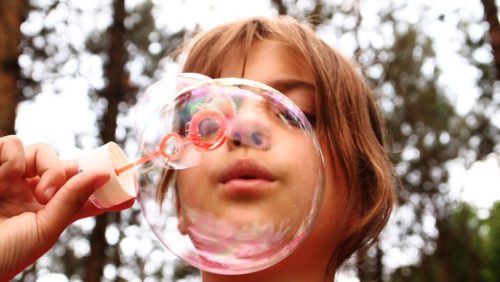
Is there a hidden gap in your marriage? Like a hole in a bicycle tire, some gaps in a relationship can be hard to see. At times, you’ll intuit them: something is off balance.The ride feels harder than it should be, but you can’t quite put your finger on what’s wrong. How do you deal with this sense of an invisible gap, of a subtle or not-so-subtle disequilibrium? Do you ignore it? Blame someone? Keep riding along until your relationship has gone completely flat? None of those choices are relationship-friendly options.
Is it the love between you that’s gone flat? Maybe you’ve noticed that your partner doesn’t express love as often as he or she once did. If this is the case, it’s worth looking into why this might be happening. One possibility is something I call the receiving gap.
What Is the Receiving Gap?
Many of us believe that because love is such a wonderful experience, something we all want, it must be easy to receive, and we consequently spend a lot of our time and energy pursuing it. Because once it’s offered, we’ll simply take in it and feel the love, right? Wrong. Over a decade of work with couples has shown me otherwise. It’s surprisingly common for people to love each other deeply and still struggle to receive one another’s love. Expressions of love from our partner can sometimes be harder to recognize for what they are and take in than criticism or judgment.

There are many reasons for this phenomenon, but one of them is something researchers refer to as a “negativity bias.” In her 2003 Psychology Today article entitled, “Our Brain’s Negative Bias,” Hara Estroff Marano writes, “Your brain is simply built with a greater sensitivity to unpleasant news. The bias is so automatic that it can be detected at the earliest stage of the brain’s information processing.”
This negative bias affects your ability to pick up on, receive, and integrate positive feedback from your partner, including love. Other things may also be at work, such as different ways of interpreting and experiencing love. Whatever is interfering with the love you’re being given in your relationship, over time, an inability to receive love from your partner can reduce the likelihood of that love being offered as often. Ultimately, you may feel stranded and bereft despite the fact that your partner loves you.
Understandably, when our partner lets us down or does something that angers us, we might have difficulty feeling loving towards them or even receiving the love they try to offer us, until the issue that caused the disconnection has been resolved.
How Does the Receiving Gap Manifest?
Sometimes even after repairing with our partner, it can be hard to let go of our defensive posture. Although defensiveness serves a protective function, it also walls us off from the very thing we deeply crave.

When our partner smiles at us and we don’t smile back, when they touch us and we criticize them, when they act on our behalf and we minimize their attentiveness, we widen the receiving gap.
This works against us in a number of ways:
-
- It decreases our partner’s desire to express their love.
-
- It reinforces the story that our partner isn’t good at loving.
-
- It hurts our partner as we fail to appreciate them.
- It sustains the myth of our own unworthiness.
To close the Receiving Gap, we need to look at what prevents us from letting love in.
Identity Issues Can Interfere with Our Ability to Express or Receive Love
Harville Hendrix and Helen LaKelly Hunt note in their book, “Receiving Love,” that taking in love involves giving up old identities. Although we may overtly want our partner’s care and affection, we may also be habituated to view ourselves as someone who is never quite worthy, perpetually anticipating satisfaction, stimulated by pathos, or unloved.

The difficulty in receiving love may also come from a mistaken perception of who your partner is and of their potential in your marriage. Maybe, in your mind’s eye, you unconsciously viewing him or her through a lens that magnifies certain qualities you judge as bad or wrong. Or maybe you see your partner as a strong individualist who doesn’t–or shouldn’t–need mushy declarations of undying love from you.
The characteristics and identities we project onto others can get in the way of seeing ourselves and our partners as dynamic, responsive, complex human beings who are capable of adapting and changing for the better. We all need connection, love, intimacy, and compassion, and we all do better when we’re accepted for who we are, even if we’re also being held accountable and challenged.
When You Fear Your Vulnerability, You Can’t Receive Love

Receiving love requires us to get comfortable with the vulnerability inherent in receiving. This can stir up all kinds of emotions from the past: grief, fear, anger, sadness, and more. It’s no small feat to receive love from another human being. Receiving is a great equalizer.
We’re taught as children that to receive is selfish. Women especially are conditioned to think of and take care of others first, to be generous and self-sacrificing in order to be viewed as “feminine.” For some, engaging in acts of receiving can feel greedy, “sinful,” or selfishly indulgent.
Receiving love requires that we acknowledge those misconceptions and choose to monitor them with skepticism until it gets easier to reject them. Letting go of old beliefs is a courageous and unsettling part of living a conscious life. It can leave us feeling lost as we learn a new way of being in our own minds and bodies, as we interface with the world around us.
How Can You Begin to Close the Receiving Gap?

If you’re ready to begin letting go of old beliefs about receiving love, and to open to the idea that you’re fundamentally worthy of love in any form, here are a few simple actions you can take to close the receiving gap that may be disconnecting you and your partner. Done regularly, these acts can slowly start to mend your bond and help your connection blossom.
-
- Smile more often at your partner, unprompted.
-
- Return their smile when they initiate.
-
- Reach for their hand.
-
- Lean into them when they reach for you.
-
- Notice and thank them for all the little things they do for you.
-
- Leave them a short love note, on occasion.
-
- Curb your tendency to criticise them and instead approach them with curiosity.
-
- Tell them, “I love you,” while hugging them or holding their gaze.
-
- Take a moment to lie next to them in stillness while synching your breath to theirs.
- When they talk to you, stop what you’re doing, give them your full attention, and listen.
Notice the love that’s right under your nose today, and start closing the gap.







